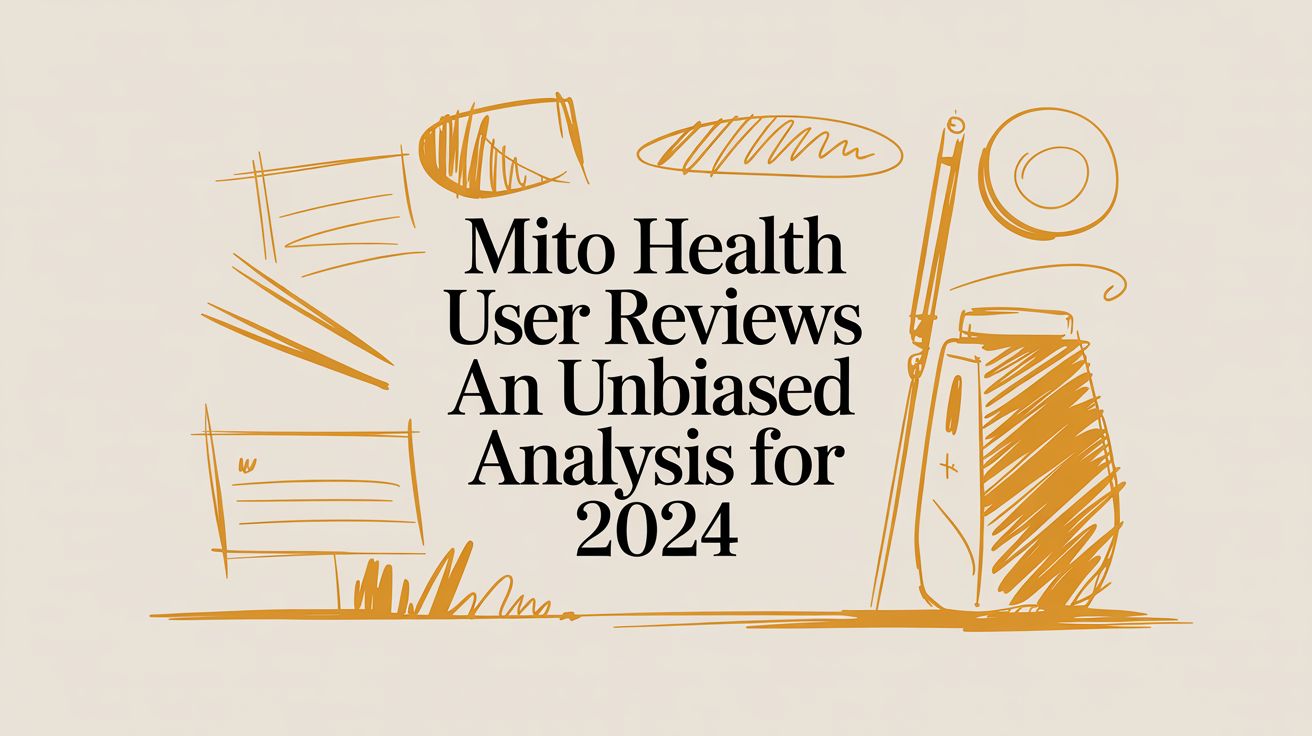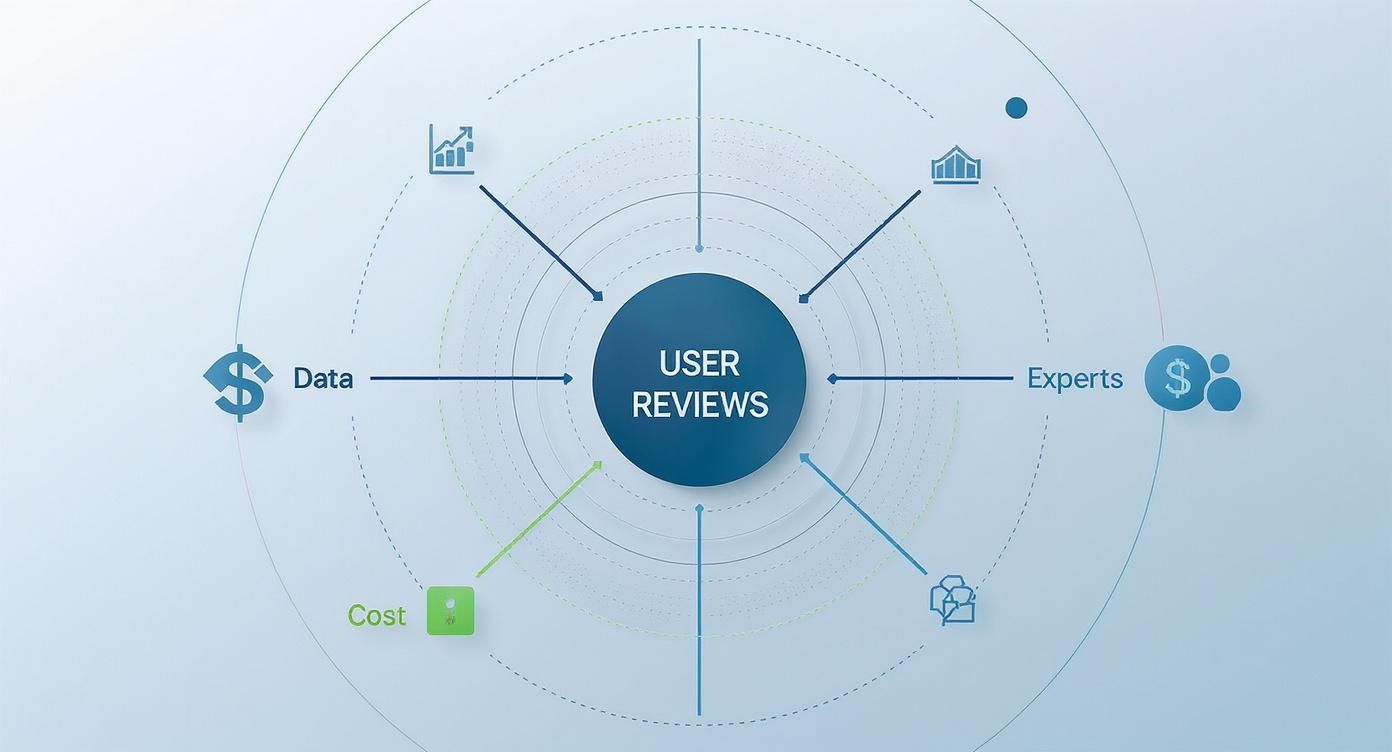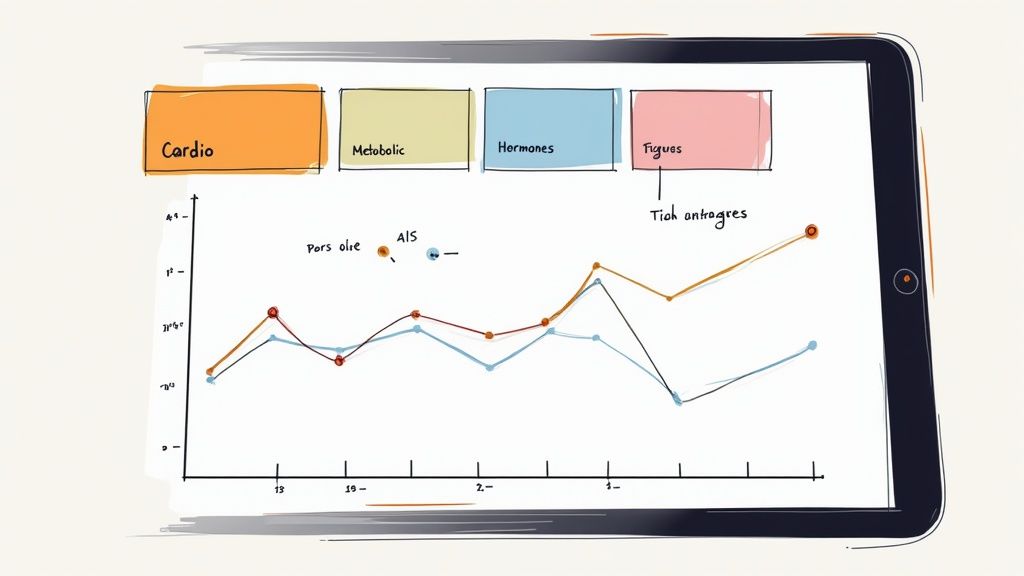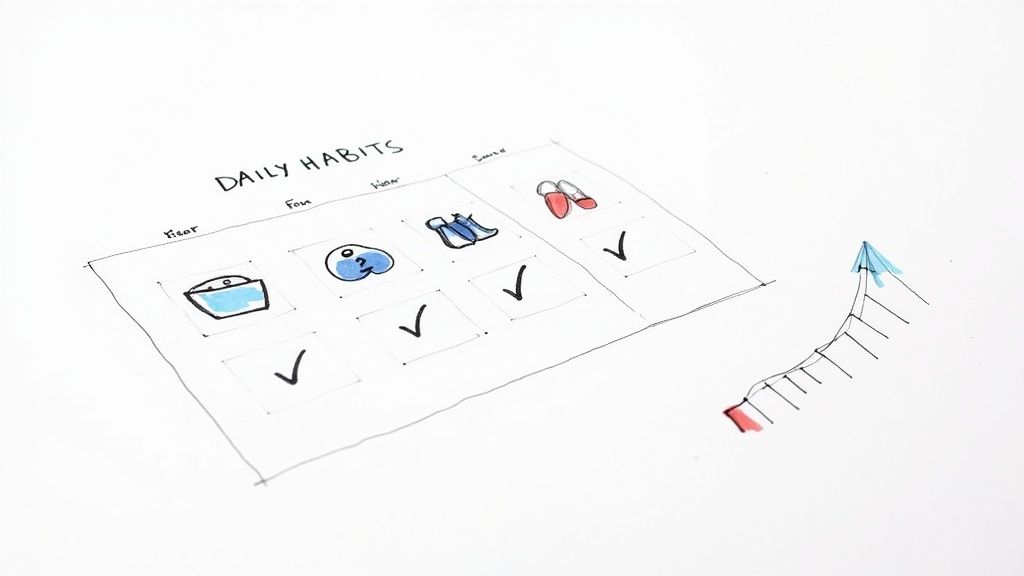Are you considering Mito Health? Our in-depth analysis of Mito Health user reviews covers the platform's AI insights, testing accuracy, cost, and overall value.

Diving into the world of advanced health tracking can feel overwhelming, but one thing is clear from the flood of Mito Health user reviews: it's a powerful tool for getting deep, data-driven insights into your body. People consistently praise the platform's detailed biomarker testing and one-on-one consultations, though it's hard to ignore that the premium price tag is a major part of the conversation.
Disclaimer: This article is for informational purposes only and is not a substitute for professional medical advice. Always consult with a qualified healthcare provider before making any changes to your lifestyle, diet, or medication.
So what exactly is Mito Health? Think of it as a high-definition snapshot of your internal wellness, something that goes leagues beyond what you get from a standard annual physical. The service takes data from over 100 biomarkers and translates it into a practical, actionable health strategy.
These biomarkers are your body’s own internal data points, covering everything from your cardiovascular health to specific nutrient levels. By analyzing this massive dataset, Mito Health aims to flag potential health risks long before they turn into serious problems. This proactive, preventative approach is something users bring up again and again as one of its biggest draws.
When you sift through dozens of Mito Health user reviews, a few key themes pop up. Almost everyone is impressed with the sheer volume and depth of the data they receive. Having the ability to track trends and make sense of complex health metrics through a clean, visual dashboard is a feature that gets a lot of love.
On the other hand, cost is a recurring topic. It’s a classic value-versus-price debate. Many users feel the investment is completely worth it for the sake of long-term, preventative health. Others, however, see it as a significant financial hurdle. For a more detailed look at the service's legitimacy and overall value, you can check out our deep dive into whether Mito Health is a legitimate service.
"I highly recommend Mito Health for their comprehensive health screening and diagnostics... Dr. Ryan's professional and informed consultation was invaluable in understanding my health markers and developing a personalised plan." - Jia Jih “JJ” Chai, Mito Health User
To cut through the noise, I've put together a quick summary of the most common points—both good and bad—that show up in user reviews. This table gives a balanced look at what people love about the platform versus the concerns they raise most often.
Ultimately, the feedback shows a service that delivers incredible depth but requires both a financial and personal commitment to get the most out of it.
At the heart of the Mito Health experience is its extensive lab testing, a feature that comes up constantly in mito health user reviews. This isn't your standard physical. We're talking about a deep analysis of over 100 biomarkers—think of them as your body's own internal data points, signaling how well everything from your heart to your hormones is functioning.
Many users draw a sharp contrast between this deep dive and the surface-level checks they're used to. While a routine doctor’s visit might check basic cholesterol, Mito Health digs into a much wider panel of cardiovascular markers. This big-picture view is designed to catch subtle risks that might otherwise fly under the radar, a detail many people feel is a total game-changer for staying ahead of potential health issues.
This concept map gives a great visual of the main themes popping up in user feedback, which really boil down to data, expert guidance, and cost.

You can see how users are constantly weighing the incredible value of getting detailed data and professional advice against the financial investment it takes.
The whole thing kicks off with a blood draw at one of their partner labs, a step that most reviews describe as simple and straightforward. Mito provides clear instructions ahead of time, covering everything from fasting to pausing certain supplements to make sure the results are as accurate as possible. People often mention this organized prep as a real plus.
Once the lab does its thing, your results are loaded into a personal health dashboard online. The turnaround time gets a lot of praise, with many users reporting they had their data in hand within a week.
This isn't just data for data's sake; it's having a real impact. According to their stats, 64% of users have pinpointed and started addressing elevated health risks, 36% have uncovered nutrient deficiencies, and a critical 4% detected serious conditions that needed immediate medical follow-up. The platform specifically tracks 67 key biomarkers linked to longevity, offering a much more nuanced health assessment than you’d get from traditional metrics alone. You can read more about how AI is shaping preventative health platforms.
Getting a report with over 100 data points sounds like it could be completely overwhelming. This is where Mito Health really shines, according to reviews. They do a fantastic job of making all this information easy to understand. For instance, instead of just throwing a number at you for insulin sensitivity, they'll explain it with a simple analogy.
Think of insulin as a key and your cells as locks. Good insulin sensitivity means the key fits perfectly, easily unlocking your cells to let in glucose for energy. Poor sensitivity is like a rusty lock that the key struggles to open.
This knack for translating complex biology into concepts anyone can get is a huge win. It empowers you to understand not just what your numbers are, but why they matter. If you're weighing different at-home testing options, our deep dive on Everlywell vs. Mito Health tests breaks down the key differences.
If you scroll through Mito Health user reviews, one theme pops up again and again: the platform’s powerful hybrid approach. It’s not just about spitting out raw data. Mito masterfully blends sophisticated AI analysis with one-on-one guidance from actual medical experts, creating a supportive experience that users consistently praise.
It all starts with the AI. Picture it as a super-intelligent detective combing through mountains of evidence—in this case, your 100+ biomarkers. The system is built to catch subtle patterns and connections that might otherwise go unnoticed, flagging potential health issues long before you'd ever feel a symptom. This gives you a solid, data-driven starting point.
But here's where the magic really happens. After the AI does its heavy lifting, human experts—licensed clinicians and health coaches—jump in. Their job is to translate those complex, data-heavy reports into a practical health roadmap that actually fits into your life.
This "best of both worlds" model is what makes Mito Health feel so different from purely automated services. A lot of users mentioned that AI-only platforms often left them with more questions than answers. Mito solves that problem head-on by putting empathy, context, and clear communication at the center of the experience.
"The clinician’s note contains a summary section followed by details specific to each category. The summary is particularly useful, since it hits on all the same points that you’ve been wondering about... For me, these notes are worth the cost of membership." - Dann Berg, Function Health Reviewer
This gets to the heart of what people find so valuable: having a real professional connect the dots between the numbers and your day-to-day life is a game-changer.
The way the technology and human expertise flow together creates a clear, actionable path forward. Here’s a quick rundown of how it works:
This seamless process is a huge part of why Mito Health has earned the trust of over 40,000 members around the world. People consistently point to the unique value of getting comprehensive lab testing and AI insights paired with direct access to medical professionals. The entire model, which grounds its feedback in your family history and clinical-grade data, is what draws in people who want genuine guidance, not just a spreadsheet of numbers. You can see more on their practitioner-focused approach on their site.
Simply put, the success you see reflected in user reviews comes down to Mito’s ability to make complex health data both easy to understand and genuinely actionable, all thanks to its smart, human-centered model.

Once your lab results are in, the Mito Health dashboard becomes your personal command center. Digging through mito health user reviews, this is where the platform seems to make its biggest impression—for better or, initially, for worse. The whole point of the design is to take a huge amount of complex data and make it understandable, even if you don't have a medical degree.
A lot of users rave about the dashboard’s visual clarity. Instead of just dumping a list of numbers on you, your results are neatly sorted into categories that make intuitive sense, like cardiovascular, metabolic, and hormonal health. This helps you immediately grasp the big picture of how your body's systems are interconnected.
One feature that gets mentioned over and over is the simple color-coding. Your biomarkers get flagged in green (great), yellow (borderline), or red (out-of-range). It’s a dead-simple visual cue that tells you where to focus your attention without getting bogged down in the details of over 100 different metrics.
Probably the most powerful tool in the dashboard, and one cited repeatedly in reviews, is the ability to see your health trends. Using AI-powered graphs, the dashboard maps out how your biomarkers change from one test to the next.
This is a massive motivational boost. Seeing your LDL cholesterol—the "bad" kind—actually trend downward after you've made changes to your diet is tangible proof that your hard work is paying off. And it's not just a feel-good feature; the National Institutes of Health emphasizes that consistent monitoring is a cornerstone of managing heart disease risk. Mito’s dashboard turns this chore into something engaging.
Here are the key features users call out most often:
"Results get presented in a data-rich, interactive online interface that shows me health trends and targets... Much better than the assembly-line experience at other health screening providers." - Christian Zhang, Mito Health User
While most of the feedback is glowing, some mito health user reviews do mention an initial "whoa" moment. Seeing that many data points at once can feel a bit intimidating right out of the gate.
But that initial feeling is almost always followed by praise for the clinician notes that come with the results. These notes add crucial context and provide a clear "action plan," turning a wall of data into straightforward next steps.
So, the short answer is yes, the dashboard is dense, but it's organized effectively. It might take a minute to get your bearings, but users generally agree its visual tools are absolutely essential for making sense of the results and staying motivated.
When you start digging through Mito Health user reviews, one topic comes up more than any other: the price. It's a hot-button issue, and the central question for anyone thinking about signing up is pretty simple: is the high price tag actually worth it for your long-term health?
Mito Health’s pricing usually starts with a big, comprehensive testing package upfront. After that, you're on a membership fee for ongoing analysis and check-ins. This setup clearly puts Mito in the premium category, and people's opinions on whether it’s a good value are split right down the middle.
One group of users doesn't see the cost as just another bill—they see it as a smart investment. These folks often talk about the price in the context of avoiding massive healthcare costs down the road. It’s a valid concern, especially when the Centers for Disease Control and Prevention (CDC) reports that a staggering 90% of the nation's annual health care spending goes toward people with chronic and mental health conditions.
From this point of view, paying for early detection and personalized health advice isn't an expense; it's a proactive way to potentially save a fortune on medical bills later while improving your quality of life right now.
"For me, these notes are worth the cost of membership. It feels like the type of information and advice I always wanted to get from my doctors, but never did." - Dann Berg, Function Health Reviewer
This feeling comes up a lot. Users who are empowered by the sheer depth of data and expert guidance feel the service offers something that standard healthcare just can't, which makes the price feel completely justified.
On the flip side, a whole lot of reviews point to the cost as a deal-breaker. For many people, the initial testing fee and the recurring subscription are simply too steep. It puts the service out of reach, no matter how great the potential benefits might be.
These users wonder about the long-term value and whether they could get similar—if less detailed—insights from more affordable sources. Ultimately, figuring out if the price is right is a deeply personal decision. If you want to get into the nitty-gritty of their pricing, we have a complete guide that asks whether the Mito Health subscription is worth it.
Your final call will probably come down to your budget, your current health situation, and just how much you value getting that level of personalized, preventative health data.

Getting back a detailed health report is a great start, but it's just that—a start. The real heavy lifting, as many mito health user reviews point out, is actually turning those insights into daily habits that you can stick with for the long haul.
Mito Health does an excellent job laying out the "what" and "why" for your personalized plan, whether that's tweaking your diet or hitting new exercise goals. But what about the "how"? That's where a lot of people get stuck, trying to connect the dots between knowing what to do and actually doing it. This is precisely where a good habit-tracking app can make all the difference.
Let's be honest, a list of recommendations isn't a plan. To really turn a complex health report into action, you need a system. You need a way to weave those recommendations into your daily life and see how you're doing. It’s that consistent, day-in-day-out tracking that builds momentum and leads to real change.
To get your plan off the ground, think about using an app that’s built for habit formation. Here are a few solid options that are great at turning health goals into reality:
"Data is only as useful as you make it, so signing up and doing the testing is only the first step towards positive change." - Dann Berg, Function Health Reviewer
That quote really hits the nail on the head. Your Mito Health data only becomes valuable once you pair it with consistent action.
Using a specialized tool bridges that gap. For instance, say your Mito report suggests boosting your omega-3 intake. An app like HeartFit lets you log that specific habit every single day, creating a tangible link between the data you received and the actions you’re taking. According to the American Heart Association, consistent omega-3 intake is a key component of cardiovascular wellness, underscoring why diligent tracking is so important.
After digging through all those mito health user reviews and getting the lay of the land, a few common questions usually pop up. Let's tackle them head-on so you can feel confident about your next steps.
This is a big one. Think of it like this: your doctor's standard blood test is like a smoke detector—it’s designed to go off when there’s already a fire (i.e., an existing disease). It screens for problems that have already started.
Mito Health, on the other hand, is more like a comprehensive home inspection. It looks at over 100 different biomarkers, checking everything from the foundation to the wiring. The goal isn't just to find fires, but to spot potential hazards and areas for improvement long before they become a problem. They then pair that deep data with AI insights and human coaching to build a proactive wellness plan, which is a world away from the typical diagnostic report you get from a lab.
Understandably, this is a top concern for anyone sharing health information. Mito Health states that it takes data security seriously, complying with privacy laws like PDPA. They mention using encryption and tightly controlled access to keep your information safe.
Of course, the best practice is always to go straight to the source. We recommend you read their latest privacy policy on their website for the full picture on how they handle your data.
Important Disclaimer: Remember, this article is for informational purposes only. It's not a substitute for professional medical advice. Always consult with your doctor or another qualified healthcare provider about any health concerns or before making changes to your lifestyle or treatment plan.
Yes, you can. For many people managing a chronic condition, Mito Health can be a powerful tool for getting a deeper understanding of what’s happening inside their body and keeping a close eye on key biomarkers.
The key word here, though, is "tool." It's meant to complement your primary medical care, not replace it. It is crucial that you continue working closely with your physician or specialist. Share your Mito reports with them and make sure any recommendations fit safely within your existing treatment plan. The goal is to add another layer of insight, not to go against the guidance of the medical team you already trust.
Mito Health reports often dig into specific cholesterol types, so it's helpful to know the basics.
Ready to turn all those health insights into real, lasting habits? Heart Fit is designed to take your bloodwork-based action plan and make it stick. We help you build a simple, motivating daily routine you can actually follow. Start creating sustainable, heart-healthy habits today at https://www.heartfit.ai.